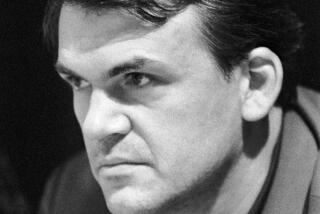Novel choice
- Share via
The WRITER B.S. Johnson was one of a handful of modern authors -- among others, Alan Burns, Ann Quin, Zulfikar Ghose -- who extended the range of the English novel by moving beyond the innovations of James Joyce and Samuel Beckett. Johnson was trivialized by a ferociously traditional British literary establishment wedded to the conventional realistic novel. He committed suicide in 1973, but thanks to his very loyal readers, his novels continue to be reprinted because they are so deeply human, formally innovative and pay microscopic attention to detail.
“The Unfortunates,” his most daring work, published in 1969, is now available, along with “House Mother Normal,” “Albert Angelo” (which has a hole cut into the pages to reveal a passage further into the story) and “Christie Malry’s Own Double-Entry” -- probably the best novel ever written about an aggrieved employee and how he comically confronts his grievances.
The reference to a box, in the book information above, is not a misprint. “The Unfortunates” is a “novel” published in the form of 26 sections collected in a box. One section is labeled “First” and another “Last” -- the reader shuffles the rest in any order he or she might wish. In the story, Johnson travels to a provincial English city to write a freelance sports article (reproduced on the inside of the box). “The Unfortunates” follows him from the moment he gets off the train and starts thinking about a deceased friend who lived there and died of cancer. That friend possessed “a fine mind, a need to communicate embodied in it, too, how can I place his order, his disintegration?”
The chance nature of the book’s design mirrors the to-ing and fro-ing of a mind working on a writing assignment and also trying to comprehend the complexity of human loss. “The Unfortunates” is not one book but many books, and it maintains a deeply moving emotional core even as the reader participates in the creation of the story. *
More to Read
Sign up for our Book Club newsletter
Get the latest news, events and more from the Los Angeles Times Book Club, and help us get L.A. reading and talking.
You may occasionally receive promotional content from the Los Angeles Times.









